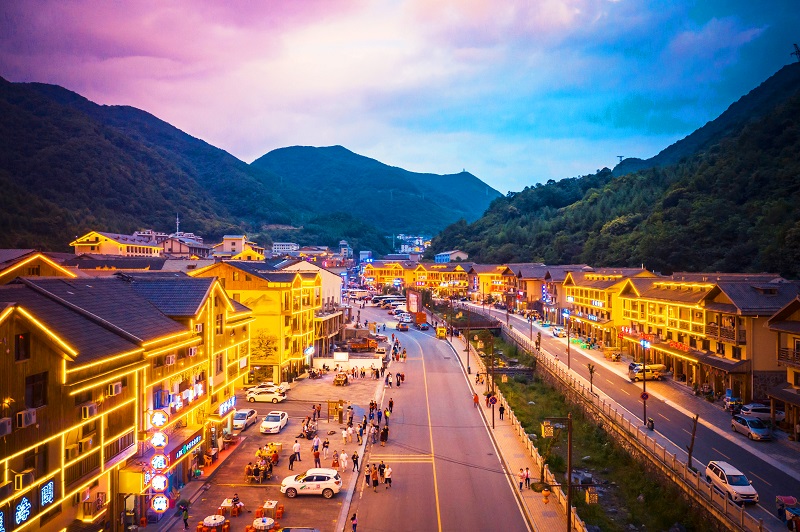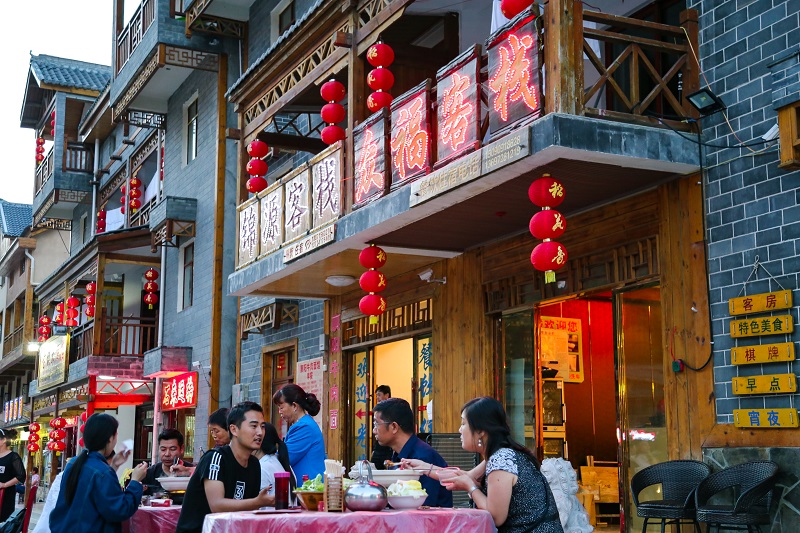One Night in Pingqian
Updated:2022-11-08 Source:Shennongjia National Park

As night fell on October 13, 2022, on the flat bottom of a valley in Jiuhu, Shennongjia, a small town called Pingqian stretched along the gentle slope at the bottom of the valley. Bright lights gave the town a modern feel, for it’s quite rare in China for a small town like Pingqian to be so brilliantly illuminated at night. The illumination suggested that there must be something extraordinary about this town.
Du Hua, director of the general office of Shennongjia National Park Administration, pulled into town and stopped at the door of a home stay. He told us that it would be our lodging for the night. The lights were all off inside, but Du Hua said the host would come soon. To be honest, I have seldom stayed in such a place and was not sure about its conditions. Soon, the host and hostess came and turned on the lights upstairs and downstairs, lighting up the house. It was bright and clean, with all kinds of facilities—it was well-designed and beautifully decorated. Although the kitchen and dining room were on the first floor, there was no bad smell at all.
As a routine during the pandemic, the host checked our health codes and travel codes before registering our identity information and handing us three room cards. The hostess had already been busy in the kitchen preparing dinner for us. From Muyu to Songbai, and from Songbai to Pingqian, we had been on the road since 8:30 that morning, so we were all hungry and exhausted and soon gathered around a "hot table" to take a rest. I don't actually know what this equipment is called locally. There is a stove below it to light the fire; an aluminum alloy pipe is connected to it to let the smoke out of the house. Above the stove is the big top of the table. It is very warm when people sit around it, and the food will not become cold when placed on the table. These tables are very practical in a place like Pingqian. While we were there, the host's younger son was back from school and sleeping soundly in a recliner.
In a short while, the hostess placed on the table four or five dishes with meat and vegetables, as well as a dish of appetizing pickles. Before our liquor glasses were filled up, we had already started tasting the dishes with our chopsticks. We kept praising the hostess's good cooking and invited them to eat and chat with us.
The host Zhang Qiming (pseudonym) and hostess Li Hongchun (pseudonym) have two children. The elder studies at a boarding school in Songbai and the younger is a second grader at a local primary school. Before moving to Pingqian, they had lived in the Dajiuhu area for generations, mainly engaged in farming, with several rooms for rent to tourists. The host has a younger brother, and their parents are still quite fit. The family grew radish, potato, corn, and other crops on a plot of about 5 acres and led a relatively prosperous life. In 2012, in order to protect the ecology and restore the Dajiuhu Wetland, the government began to encourage the villagers in Dajiuhu area to move out of the wetland and rebuild their homes in Pingqian.
"East, west, home is best." "Old habits die hard; old places are hard to depart.” These old sayings reflect a traditional concept of Chinese people. Moreover, the tombs of their ancestors were there, and no one was sure how to make a living without their own land, so they were reluctant to leave at the beginning. However, considering the importance of the national policy and ecological protection, in 2013, more than 1,800 people from more than 400 households left their hometown in tears and came to resettle in Pingqian. Fortunately, the National Park Administration subsidized their housing and cultivated land (including the wasteland reclaimed by villagers). After relocation, the villagers began developing the tourism industry and set up home stays one after another. Starting as peasants toiling in the field, many of them turn into businessmen running hotels.

As Dajiuhu’s picturesque landscape and ecological wonders attract a large number of domestic and foreign tourists, Pingqian has become a must stay for tourists traveling through the region. The simple and honest locals of Shennongjia, doing their businesses on the ancient salt road have left a good impression on tourists.
Zhang Qiming laughed at his own ignorance and reluctance to leave his hometown before and confessed that he hadn't expected that his relocation would lead to a whole new world of opportunity. After running a home stay, the family income grew much higher than before. In recent years, the pandemic has affected the income of those living in Pingqian, however, as tourism will pick back up when the pandemic is over, Pingqian’s economy will undoubtably continue to grow and flourish. (Text and photos by He Sai)Copyright Shennongjia National Park
Address:36 Chulin Road, Muyu Town, Shennongjia Forestry District, Hubei Province 鄂ICP备18005077号-3
Address:36 Chulin Road, Muyu Town, Shennongjia Forestry District, Hubei Province 鄂ICP备18005077号-3
Email:2673990569@qq.com
Phone:0719-3453368
Phone:0719-3453368


TOP

